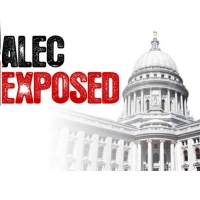ALEC Places Local Call for Less Internet Phone Service Protection

California legislation to guarantee deregulation of low-cost internet phone service (VoIP) through 2020 has roots that can be traced to a model bill drawn up by ALEC, the right-wing American Legislative Exchange Council whose nonprofit status has recently been challenged.
The legislation, which has cleared the state Senate and is headed for the Assembly, has the backing of all major telecommunication companies. Its supporters say it is designed to assure telecommunications companies that they can pursue innovative technologies without fear that regulators will throw future roadblocks in their way. Critics say it is a preemptive strike against future actions on behalf of consumers.
While much of the communications industry has already been deregulated, the state Public Utilities Commission (PUC) has always retained the power to re-regulate it, if necessary. Critics say this bill would eliminate that option.
The Utility Reform Network (TURN) calls the legislation “a wolf in sheep’s clothing” and warns that by defining VoIP broadly as an “Internet Protocol (IP) or a successor protocol,” all modern telephone services (which use the protocol), including cable, will fall outside the purview of the PUC. In a letter to the legislation’s sponsor, Senator Alex Padilla, TURN expressed the fear that telecommunications companies will use this new freedom to cut back services for rural areas, low-income customers and disabled users, while reducing basic standards and protections for all consumers.
Padilla maintains that the legislation, SB 1161, will not affect low-income customers or reduce services already guaranteed. Senator Padilla received $69,644 from telecommunications services and equipment interests from 2007-2010, according to MapLight.org., and during that period AT&T was his fifth-largest contributor at $23,900.
Padilla warns that California risks falling behind other states and losing its position as a leader in the global internet economy. At least 24 other states have similar legislation, a development not unrelated to the activities of ALEC, a group founded in the 1970s by legendary conservative activist Paul Weyrich that brings together corporations and lawmakers to draft model legislation which is then introduced in state houses around the country.
Among ALEC’s contributions is a resolution adopted in more than a dozen state legislatures criticizing the U.S. Environmental Protection Agency’s effort to regulate greenhouse gasses, calling it a “train wreck” and asking Congress to slow or stop the regulations. ALEC has been a strong voice for anti-immigration measures, privatizing government work, weakening unions, fighting President Obama’s healthcare reform law and enacting voter ID laws.
Its ranks include 2,000 lawmakers and 300 corporate members who regularly meet at conferences to craft legislation, although most of the 800 legislative templates ALEC has produced were written by just nine task forces. Common Cause filed a complaint with the Internal Revenue Service in April challenging ALEC’s tax-exempt, 501(c)(3) status because it “appears to operate primarily to further private business interests and not to advance a charitable purpose.”
–Ken Broder
To Learn More:
California Legislation Would Eliminate Consumer Protection of Internet Services (by Cheryl Leanza, California Progress Report)
Senate Bill 1161 (California Legislative Information)
When Is a Phone Call Not a Phone Call? (When ALEC Says So) (by Tracy Rosenthal, Huffington Post)
ALEC Faces New Challenge to Tax-Exempt Status (by John Dunbar, Nation of Change)
Bill Would Strip PUC's Oversight of Land Lines, Critics Say (by Marc Lifsher, Los Angeles Times)
Internet Phone Service Bill Advances in California Senate (by Marc Lifsher, Los Angeles Times)
Smart ALEC Models This Year’s Fashionable Conservatism for Lawmakers (by Noel Brinkerhoff and Ken Broder, AllGov)
- Top Stories
- Controversies
- Where is the Money Going?
- California and the Nation
- Appointments and Resignations
- Unusual News
- Latest News
- California Forbids U.S. Immigration Agents from Pretending to be Police
- California Lawmakers Urged to Strip “Self-Dealing” Tax Board of Its Duties
- Big Oil’s Grip on California
- Santa Cruz Police See Homeland Security Betrayal in Use of Gang Roundup as Cover for Immigration Raid
- Oil Companies Face Deadline to Stop Polluting California Groundwater





